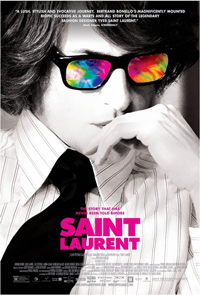Reviews
Saint Laurent | Review
Once again, Make it the Same Only New
With this biopic on the great French fashion icon Yves Saint Laurent, Bertrand Bonello streamlines for himself a reputation as one of contemporary cinema’s keenest voices on the concept of time. Coming off his Palme d’Or-contending masterpiece, House of Tolerance – a film concerned with the dichotomy between slow and rapid evolutions of people, places, and culture – Bonello once again sweeps across years of a life in a startlingly arrhythmic procession. The central theme in this case is re-materialization, namely, Saint Laurent’s propensity for reinvigorating the status quo by injecting it with the new. Unfortunately, one of the prime examples in Saint Laurent’s life of this trait was in his reliance on various mind-altering drugs – a chapter of his life that consumes and befouls roughly a full hour of the lengthy, two-and-a-half hour dalliance.
Chalk that up to the everlasting curse of the biopic genre, but Bonello clearly has more on his mind here than tribute, reenactment, and hagiography, but this only really become evident in its final hour. Before that, Saint Laurent is a steady parade through the decade stretching from 1967 to 1976, marked by a large, red font overlayed on top of the action. After a brief prologue showing Saint Laurent landing in Paris in 1974 and beginning a phone interview, the film leaps back in time to a quiet tour through Saint Laurent’s production studio in 1967. Essentially wordless, it’s a sequence depicting a collective at work that evokes any number of the lounging scenes in L’Apollonide.
Soon we’re in a dance club, where the camera – in a bravura, unbroken take – tracks Saint Laurent’s gaze across the floor to a sultry, lean blonde model (Aymeline Valade) posed on her seat back. Still without a cut, the shot follows the woman as she stands and glides under the ceiling lights and onto the dance floor, stopping to get bust a move while towering right above the camera, the audience looking up at the femme’s poised flailing. These kinds of flourishes of pure cinema, which evoke some of Martin Scorsese and P.T. Anderson’s lucidly complex choreographies, are dispersed throughout the film, along with time-passing montages that jostle us from out of the repose we may slip into as Bonello deviates into the more unappealing aspects of the designer’s life.
A range of supporting roles enter and exit the narrative with a certain casual freedom, some lingering longer than others. Louis Garrel arrives to portray Saint Laurent’s doomed muse Jacques de Bauscher, who lures him away from his partner and life manager Pierre Bergé (Jeremie Renier) into a life of drugs and orgies. Lea Seydoux, meanwhile, is practically window-dressing as Loulou, who spends a great bulk of her time onscreen tending to any number of French bulldogs. Moujik, Saint Laurent’s favorite Frenchie, is resurrected four times in the span of the film’s narrative; after first dying of an overdose on spilled pills, the dog is replaced with an identical copy each time he dies, with the film ultimately concluding in the era of Moujik IV.
The dogs, of course, are part of the aforementioned theme of re-materialization, and help contribute to the portrait of Saint Laurent as a man pathologically fixated on maintaining what is familiar to him, resisting swift changes to his life or his work. Having admitted to taking great liberties with facts and the biopic form, Bonello obviously wants his film to function first as a psychological study, second as a time capsule chronicling the end of an era drunk with a desire for freedom. Saint Laurent fluctuates between both modes, and is wildly inconsistent with its methods. The downside to this is that there are extended patches of the film that feel frustratingly expository; the upside is that the film, in line with humanity, is not only ever alive, but always on the cusp of breaking out into new forms, rhythms, and tones.
Reviewed on May 19th – Main Competition – 150 Minutes
★★★/☆☆☆☆☆
Blake Williams is an avant-garde filmmaker born in Houston, currently living and working in Toronto. He recently entered the PhD program at University of Toronto's Cinema Studies Institute, and has screened his video work at TIFF (2011 & '12), Tribeca (2013), Images Festival (2012), Jihlava (2012), and the Pacific Film Archive in Berkeley. Blake has contributed to IONCINEMA.com's coverage for film festivals such as Cannes, TIFF, and Hot Docs. Top Films From Contemporary Film Auteurs: Almodóvar (Talk to Her), Coen Bros. (Fargo), Dardennes (Rosetta), Haneke (Code Unknown), Hsiao-Hsien (Flight of the Red Balloon), Kar-wai (Happy Together), Kiarostami (Where is the Friend's Home?), Lynch (INLAND EMPIRE), Tarantino (Reservoir Dogs), Van Sant (Last Days), Von Trier (The Idiots)






















